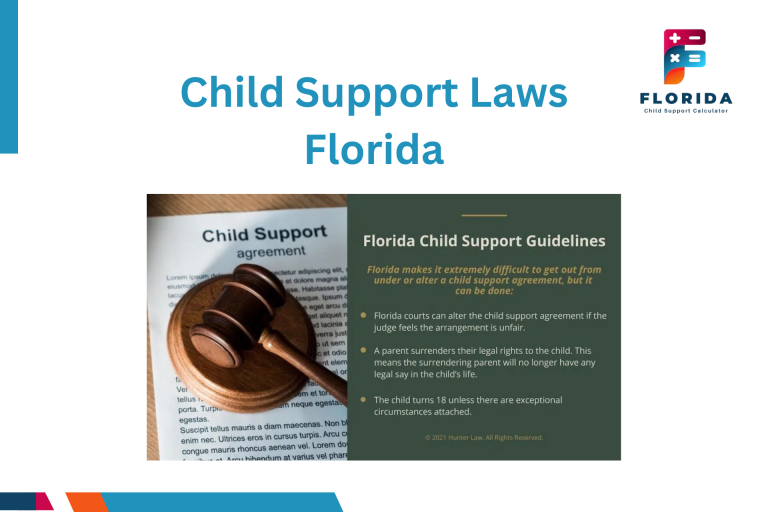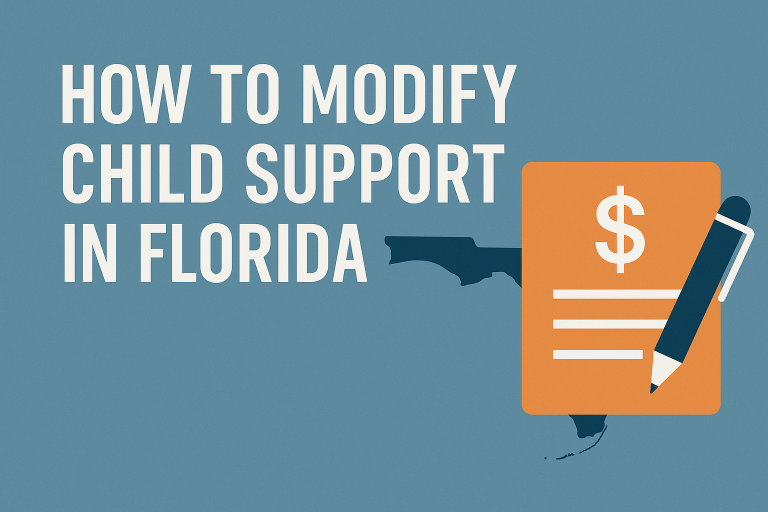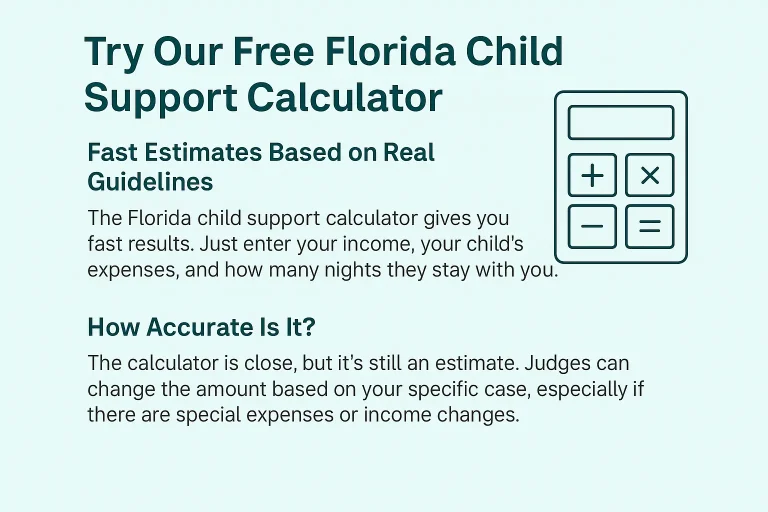Understanding Child Support Laws in Florida
Child support laws in Florida are like a rulebook for parents who live apart but still share the job of raising a child. These laws make sure every kid gets the food, clothes, and care they need, even when parents aren’t under the same roof. If you’re just starting to figure this out, try our Florida child support calculator to get a rough idea of what you might owe or receive.

Many parents ask: When does it end? Can it be changed? Don’t worry, we’re going to explain everything step by step. And if you’re dealing with a tough situation like unpaid support, our guide on jail for not paying child support in Florida covers the serious stuff.
Whether you’re paying or receiving, knowing the Florida child support guidelines will help you make smart choices for your child and yourself.
What Are the Current Child Support Laws in Florida?
Child support laws in Florida make sure both parents take care of the child, even after separation or divorce. These rules are based on fair sharing and follow a set law called Florida Statute §61.30.
Florida Statute §61.30 and the Income Shares Model
Let’s say raising a child is like paying rent; you both pitch in. Florida uses the Income Shares Model, where the court looks at both parents’ income. This model is explained clearly in the Florida child support guidelines, which show how courts decide the right payment.
This law helps figure out a fair amount by looking at your job income, the number of kids, and how often each parent has them overnight.
Who Needs to Pay Child Support? (Even If Never Married)
Even if you were never married, you still have to support your child. Florida doesn’t care if you signed a wedding paper; it cares if you’re a parent. If you’re not sure how this applies to you, this page about income and support can help clear things up.
Both moms and dads can be asked to pay, depending on the money they make and the time they spend with the child.
Basic Obligations of Both Parents
Parents share the cost of a child’s daily needs, food, school, clothes, and doctor visits. The amount depends on who earns more. To see your estimate, try using the child support calculator before going to court.
Florida Child Support Guidelines & Key Rules in 2025
Florida updates its laws to keep things fair and modern. The child support guidelines help the court decide how much each parent must pay.
Minimum Monthly Support
Even parents with little or no income may still be asked to pay. Courts often order a minimum of $50 per month just to keep things equal. Here’s a quick example:
| Parent Income Level | Time-Sharing % | Minimum Support Ordered |
|---|---|---|
| $0 (Unemployed) | Less than 20% | $50/month |
| Part-time work | 30% | $90–$150/month |
| Full-time income | 50% | Adjusted per the calculator |
To check the exact number for your situation, use the free Florida support calculator.
Parenting Time and Time-Sharing Breakdown (List + Example)
Florida counts overnight stays to decide payment. If you keep your child for 20% or more of the nights (that’s about 73 nights a year), it’s called “shared custody,” and your payment might go down. Here’s how it works:
- 0–72 nights/year: You pay full support.
- 73–182 nights/year: Shared custody formula applies.
- 183+ nights/year: You may pay less or none (depends on income).
This kind of arrangement is explained better in the shared custody payment guide if both parents are involved.
What If You Live Out of State?
Even if one parent lives outside Florida, these laws still apply. Florida courts can work with other states to make sure payments happen. Learn more in the Florida child support enforcement section if you’re having trouble with someone avoiding payment.
How Is Child Support Calculated in Florida?
Florida uses a set formula. It looks at both parents’ gross income, approved expenses (like daycare or health insurance), and how often the child stays with each parent. You can skip the math and use the Florida child support calculator for a quick estimate.
What Counts as Income?
Florida includes:
- Job pay, bonuses, commissions
- Disability or unemployment
- Business or rental income
The full list is in the income calculation guide.
Example:
Parent A earns $4,000, Parent B earns $2,500, both share time 50/50.
→ Parent A may pay around $150/month.
Use the calculator to check your numbers.
Allowable Deductions and Imputed Income
Before the court decides how much child support you pay, it lets you subtract certain costs. These are called “allowable deductions.” But if you’re not working on purpose, the court may still count what you could earn. That’s called “imputed income.”
Dedications for Health, Daycare, and More
When calculating support, Florida lets you take away money spent on your child’s needs, like health insurance, daycare, and medical costs. These amounts are taken out before the final number is set.
If you’re unsure which deductions apply to you, check the income and support breakdown page. That section explains what the court accepts and what it doesn’t.
Even small deductions like vision care or dental plans can affect the final payment, so every bit matters.
When Courts Assume Your Income (Imputed Income)
Let’s say someone quits their job just to avoid paying child support. The court won’t fall for that. In these cases, judges use imputed income calculated for a child, which means they estimate how much that person should be earning based on skills or past jobs.
This is common in high-conflict cases, especially when one parent feels the other is hiding money. You’ll find more examples of these cases on the retroactive and unpaid support guide, where courts take action if someone dodges their responsibilities.
Can Florida Courts Deviate from the Guidelines?
Florida child support laws follow a strict rulebook, but sometimes, life doesn’t fit in a rulebook. That’s when courts might choose to “deviate” from the standard formula.
Special Circumstances That Justify a Deviation
Courts may change the usual child support amount if something unusual is happening. For example:
- The child has special medical needs
- One parent earns much more or much less
- The child spends more time with one parent than expected
If you’re thinking your case is different, it helps to read about real-life situations on the modification page, where support amounts were changed.
Even small details, like who pays for school uniforms or tutors, can lead to deviation.
How to Request a Deviation
You can’t just tell the court, “It’s not fair.” You need to file a proper legal request with strong evidence. Bring proof of income, expenses, and any special needs your child has.
Parents often think they’ll talk it out informally, but only an official court order works. If you’re also curious about what happens when both parents work, visit the shared income and support guide to see how the court splits things.
Can You Get Retroactive Child Support in Florida?
Yes, you can ask for child support for the time before the court order started. This is called “retroactive support.” It helps cover months where one parent didn’t pay but should have.
What Is Retroactive Support?
Retroactive support means back pay. Florida law allows you to go up to 24 months back in time. So if you’ve had no help for the past year, you could legally ask the court to collect what’s owed.
The amount is based on what the parent would’ve paid if support had started earlier. To estimate this, start with the child support calculator and pick dates going backward.
Maximum Retroactive Period (24 Months Rule)
Most parents don’t know about the “two-year rule.” The court usually won’t go further than 24 months unless special facts are proven.
If you’re filing late, don’t panic. Learn how to prepare your case on the support enforcement and unpaid support page, especially if the other parent is skipping out.
Defending Against Retroactive Claims
What if someone’s asking you to pay retroactive support and you truly couldn’t afford it? The court will look at your past income and expenses. But you need documents or proof, like job records or hospital bills.
If you’re facing this situation, the modification and income calculation section gives a good idea of how income levels matter.
Shared Custody and Its Impact on Child Support
When both parents share time with the child, it changes the way child support is calculated. Florida uses a time-sharing formula that looks at how many nights the child spends with each parent.
The 20% Overnight Rule
Florida law says if one parent has the child for at least 20% of the nights in a year (about 73 nights), it counts as shared custody. This rule can reduce the amount of support one parent has to pay.
To see how overnights affect your payments, visit the shared parenting and work guide, which breaks this down by percentages.
If you’re close to the 20% mark, keep track; it could save you hundreds per month.
When 50/50 Custody Still Means Payments
Even if you both have your child 50/50, one parent might still pay support. Why? Because courts also look at income. The parent who earns more usually pays something, even in equal custody cases.
This is common in cases where one parent works full-time and the other has part-time income. You can run both incomes through the support calculator to see how it plays out.
How Income Disparities Influence Support
Courts want kids to live the same quality of life at both homes. If one home has much more income, the other may get support to balance things.
If your income is being judged unfairly, the income calculation page shows what the court counts and what it doesn’t.
When Does Child Support End in Florida?
Child support doesn’t last forever. But there are some exceptions where it might last longer than expected.
Standard End Date vs. Exceptions
In most cases, child support ends when the child turns 18. But if the child is still in high school and will graduate before turning 19, support can last until then.
You can double-check your situation using the Florida child support guidelines, which explain the end-date rules.
Some parents are surprised to find payments continue into the child’s final high school year.
What Happens After High School?
If your child has a disability or needs extra care, support might continue even after high school. These are rare cases, but they do happen.
If you’re unsure whether your case qualifies, the modification guide has examples of changes based on long-term needs.
What If My Ex Quits Their Job to Dodge Payments?
Some parents stop working or take low-paying jobs to avoid paying child support. But Florida courts can still make them pay based on what they should be earning.
Proving Voluntary Unemployment
Courts look at job history, education, and skills to decide if a parent could earn more. If your ex is avoiding work on purpose, the judge can assign imputed income.
This topic is explained in detail on the income calculation and imputed income page, where you’ll see how income gets “guessed” based on past jobs.
Legal Remedies You Can Use
You can bring this up in court with job records, pay stubs, or even online job listings. The court needs proof, but once they have it, they can order payment anyway.
To understand your options when someone tries to skip out, review the unpaid child support consequences that Florida courts can enforce.
If I Remarry, Will My Child Support Be Reduced?
Getting married again doesn’t automatically lower your child support. Florida looks at your income, not your new partner’s.
Spouse’s Income and Legal Boundaries
Florida courts don’t include your new spouse’s paycheck when calculating child support. It’s all about what you earn. But if remarriage changes your expenses or job, it might affect your case.
Some parents ask about this on the modification request page, especially if they’re sharing bills with a new spouse.
The key is: Your new marriage doesn’t erase your old responsibility.
When Courts Recalculate Support
If you’re earning more (or less) because of changes after marriage, you can request a modification. But courts need proof, like updated income or a big shift in parenting time.
The income adjustment calculator helps you check how much might change before you file.
How to Modify Child Support in Florida
You can’t change your child support amount just by agreement. You need a legal modification, and only if there’s a strong reason.
Valid Reasons for Modification
Courts allow support changes if there’s a substantial, permanent, and involuntary change. That means:
- You lost your job
- Your child’s needs increased
- Custody time changed
To understand this better, visit the Florida child support modification page, it has examples of when the court said yes (and no).
Steps to File for a Change
First, gather proof: pay stubs, custody calendars, or medical bills. Then file the official form in your county court.
Some parents try to do this alone, but if the other parent disagrees, it’s smart to get help. The forms and legal info page lists what paperwork you’ll need.

Why Verbal Agreements Don’t Count
Saying “We’ll just handle it ourselves” sounds easy, but it doesn’t work in court. Judges only go by what’s written and signed.
If you skipped formal changes in the past, the support enforcement section shows what can go wrong when records don’t match.
Try Our Free Florida Child Support Calculator
If you want a quick answer about how much child support might be, use our calculator. It’s based on real Florida guidelines, not guesses.
Fast Estimates Based on Real Guidelines
The Florida child support calculator gives you fast results. Just enter your income, your child’s expenses, and how many nights they stay with you.
The numbers are built using Florida Statute §61.30, the same rules the court uses. This helps you prepare before your hearing or discussion with the other parent.
How Accurate Is It?
The calculator is close, but it’s still an estimate. Judges can change the amount based on your specific case, especially if there are special expenses or income changes.

To learn how courts make those changes, review our child support deviation section, where rules shift based on real life.
Frequently Asked Questions About Child Support in Florida
Every parent has questions, and you’re not alone. These common answers help clear up confusion about Florida’s child support laws.
Can I Stop Paying When My Child Turns 18?
Most of the time, yes. Support usually ends when the child turns 18, unless they’re still in high school and expected to graduate before 19.
To know for sure, go through the guidelines page or check your court order carefully.
Can Parents Waive Support by Agreement?
Even if both parents agree to “cancel” support, courts may say no. Child support income is calculated by the parent. Only a judge can change or stop support officially.
If you’re thinking about changes, use the modification form guide to file it properly.
What If the Receiving Parent Misuses Funds?
Florida courts don’t track how support is spent unless there’s proof of neglect or abuse. Even if the money isn’t being spent right, stopping payments can lead to legal trouble.
In serious cases, refer to the enforcement and jail risk section for what not to do.
Conclusion
Florida’s child support laws are designed to make sure kids are taken care of, no matter what family setup you have. From how much you owe to when payments stop, everything follows a set of rules based on income, parenting time, and real-life needs.
If you ever feel stuck, using the child support calculator is a smart first move. And if your income or situation changes, the child support modification process helps you adjust legally.
In the end, child support is about fairness for the child and both parents. Following the Florida child support guidelines keeps everything clear, safe, and in the best interest of your child.
